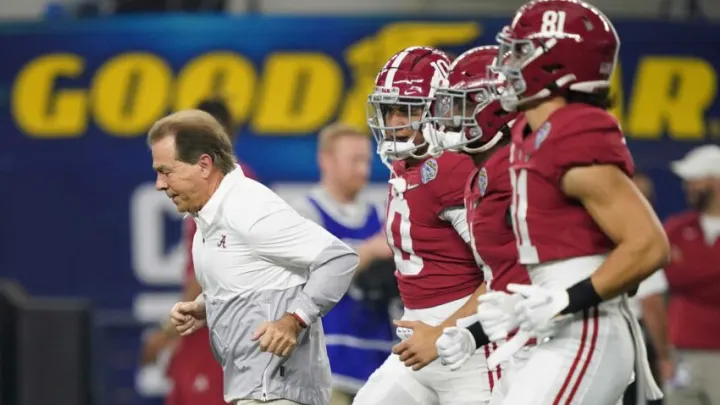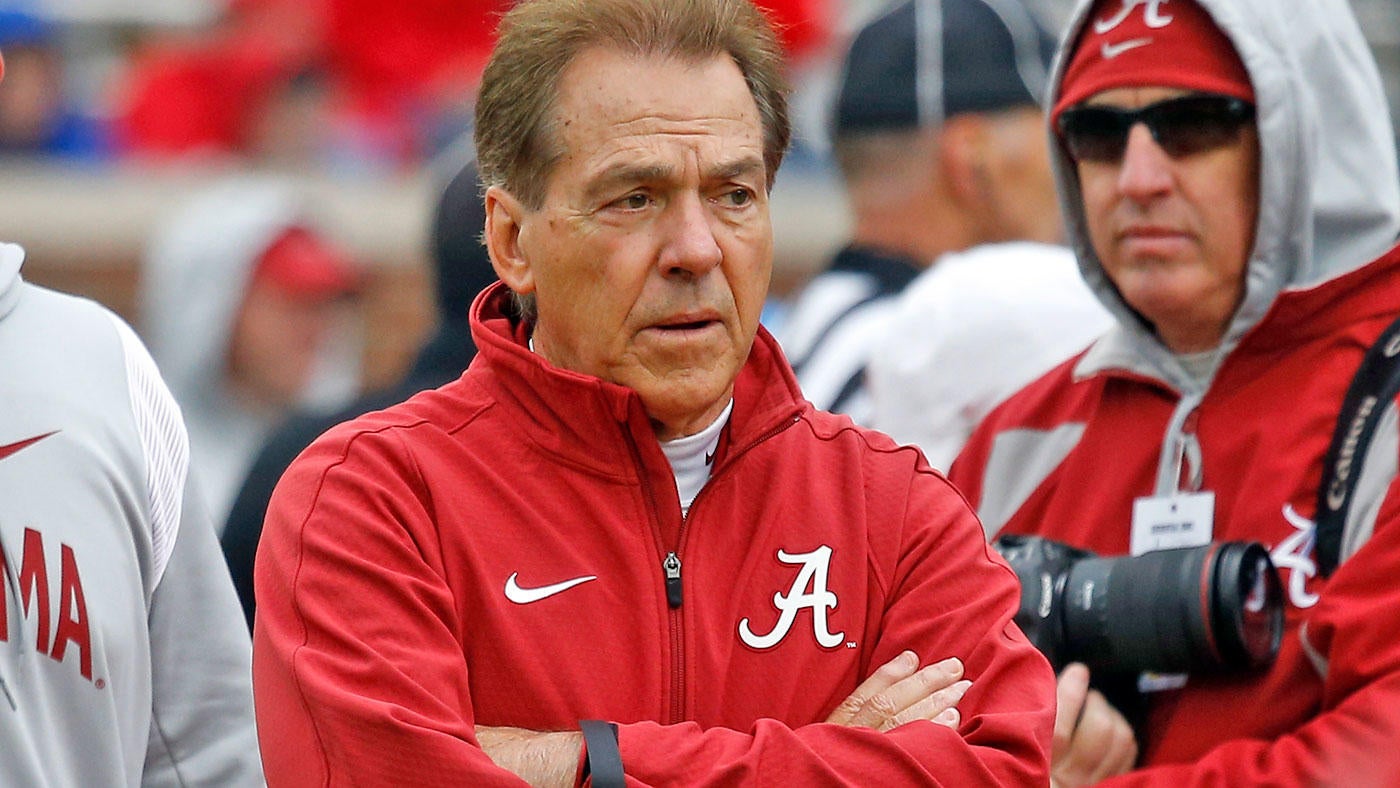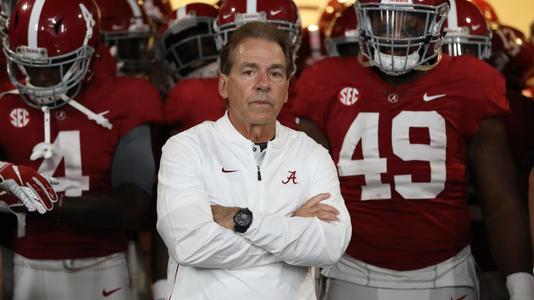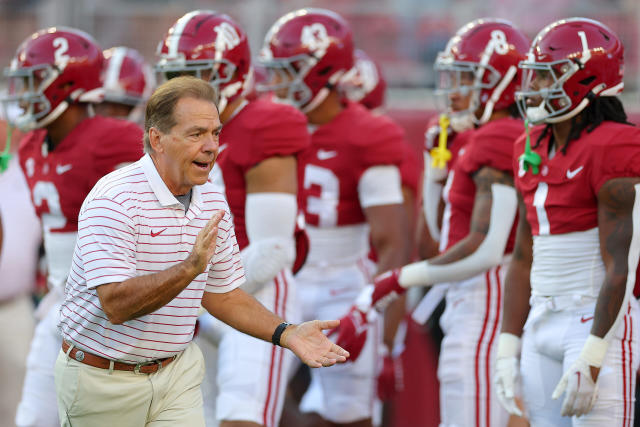
A man of vision who has a proven record of championship success, head coach Nick Saban has returned the University of Alabama to the top of the college football landscape with his commitment to building the total program.
After the victory over Clemson in the 2016 College Football Playoff National Championship Game, Saban joined Paul “Bear” Bryant as the only two coaches to win five national titles in the modern era.
Beginning his 11th season in Tuscaloosa, Saban’s uncompromising dedication to excellence in every phase of the program has resulted four national championships over the last seven years. A seven-time National Coach of the Year, Saban has achieved resounding success as a head coach and has earned a reputation as an outstanding tactician, leader, organizer and motivator. Those qualities have sparked impressive turnarounds at every stop of his career. Saban’s consistent approach and disciplined leadership are the reasons his teams are known for exhibiting grit, determination and resilience, often overcoming adversity to achieve victory.
Saban’s 2016 squad completed an undefeated regular season for the first time since 2009 and secured the program’s 26th SEC Championship – the third straight for the program – and the fourth in the last five years. The Tide defeated Washington in the semifinals of the College Football Playoff in the Chick-fil-A Peach Bowl (24-7), before dropping a stunning 34-31 game to Clemson in the CFP National Championship Game in Tampa, Fla. Alabama finished with a 14-1 record after defeating nine ranked teams and 11 teams that qualified for bowl games during the 2016 season. Alabama finished the year No. 2 in the national polls.
Saban, who was named the SEC Coach of the Year and Munger Award National Coach of the Year (presented by the Maxwell Football Club), had five players earn first team All-America honors – Jonathan Allen, Minkah Fitzpatrick, Reuben Foster, Marlon Humphrey and Cam Robinson. Allen also captured the Nagurski Trophy and the Bednarik Award, both of which go to the national defensive player of the year, and the Hendricks Award as the nation’s top defensive end, while Foster won the Butkus Award that is given to the nation’s best linebacker, and Robinson captured the Outland Trophy. The senior class posted a NCAA-record 51-6 record from 2013-16 and a 64-7 over the last six years which is also the best in NCAA annals.
Saban has compiled a 205-61-1 (.770) record as a college head coach and has gone 112-13 (.896) in the past nine seasons in Tuscaloosa, which includes a 64-8 (.889) mark in regular season conference play. In 2016, the Tide reached the 10-win milestone for the ninth consecutive season and won 11 or more games for the sixth straight year, which extended the conference record. Saban is 12-2 all time in conference or national championship games. Alabama has been ranked No. 1 in the Associated Press poll for at least one week for nine straight years, which broke the all-time record of seven established by Miami (1986-92). Alabama extended its streak of consecutive weeks in the AP Top 25 to 145 weeks, the longest in school history.
The 2015 team secured the Crimson Tide’s fourth national championship in the last seven years. They became the first team to win back-to-back Southeastern Conference Championships in 17 years (Tennessee, 1997-98) and were the only program to earn an invitation to each of the first two College Football Playoffs. Saban led his team to victories in the final 12 games of the season, including wins at No. 8 Georgia, at No. 9 Texas A&M, vs. No. 4 LSU, at No. 17 Mississippi State, against No. 18 Florida in the SEC Championship Game, vs. No. 3 Michigan State in the Goodyear Cotton Bowl and over No. 1 Clemson in the College Football Playoff National Championship Game. The senior class won a school-record 50 games (50-6) over their four years with three SEC Championships and two national titles.
The Crimson Tide featured Heisman Trophy winner Derrick Henry, who also captured the Maxwell Award, Walter Camp Player of the Year and Doak Walker Award. Ryan Kelly won the Rimington Trophy as the nation’s top center. Linebacker Reggie Ragland was a finalist for the Butkus Award, Nagurski Trophy and the Bednarik Award, while A’Shawn Robinson was a finalist for Outland Trophy. The offensive line was also awarded the Joe Moore Award, which goes to the nation’s toughest line. All four of the Tide’s finalists garnered first team All-America honors, while Eddie Jackson was a second-team selection.
Henry set school records for rushing yards (2,219), rushing touchdowns (28), rushing attempts (395) and all-purpose yardage (2,310). A trademark of Saban-coached teams, the Tide ranked among the nation’s best on both sides of the ball, checking in at No. 1 in the country in rushing defense, No. 3 in total defense and scoring defense, and eighth in pass efficiency defense while averaging 199.9 rushing yards and 227.1 passing yards per game on offense. Special teams were also impressive in 2015 with Cyrus Jones setting the SEC record with four punt returns for touchdowns and place-kicker Adam Griffith connecting on 23 of his final 28 field goals. Saban’s on-side kick call in the national championship game proved key, propelling the Crimson Tide to the program’s 16th national title. In the classroom, the numbers were just as astounding, as UA had a nation-leading 29 graduates on the roster for the bowl game including three players with their master’s degree in hand.
He is the first coach to win back-to-back BCS national championships and has won five titles in his last 11 years of coaching college football. Saban is one of three college coaches in the poll era (since 1936) to win three national championships in four years, joining Frank Leahy of Notre Dame (1946-47, 1949) and Tom Osborne of Nebraska (1994-95, 1997). He is also just the second (Leahy) to win four titles in seven years. He is the second coach in the poll era to win at least five national championships (Paul “Bear” Bryant).
Saban, the 2014 Bobby Dodd National Coach of the Year, led the Crimson Tide to the top seed in the first College Football Playoff at the 2015 Allstate Sugar Bowl, Alabama’s 24th SEC Championship and a 12-2 record. Alabama won its final eight games to earn a spot in the playoff, including a closing gauntlet that included wins at No. 14 LSU, over No. 1 Mississippi State, against No. 15 Auburn and versus No. 14 Missouri in the SEC Championship. The 2014 senior class finished with a 48-6 record over four years and went to four straight New Year’s Six Bowls, including national championships in 2011 and 2012. The Crimson Tide featured Heisman Trophy finalist and UA’s first-ever Biletnikoff Award winner Amari Cooper and Nagurski Trophy and Thorpe Award finalist Landon Collins. Along with Cooper and Collins, Ray Guy Award finalist punter JK Scott, linebacker Trey DePriest and offensive guard Arie Kouandjio garnered first team All-America honors. SEC Championship Game MVP Blake Sims set school records for total offense (3,837 yards) and passing yards (3,487), while Cooper established UA marks in every receiving category. The Tide ranked among the nation’s best on both sides of the ball, checking in at No. 6 in the country in scoring defense and 15th overall in scoring offense. In the classroom, Alabama had 22 graduates on the roster for the bowl game (tied for the most in the nation) and seven players with their master’s degree in hand (first in the nation).
Saban led the 2013 Alabama team to the Allstate Sugar Bowl, making a sixth straight New Year’s bowl appearance and the third straight in a BCS bowl. That senior class posted a remarkable record of 60-7 over their last five years with four bowl wins and three national titles. Their record in the classroom was just as impressive as 28 Crimson Tide graduates took the field for the bowl matchup with Oklahoma. Senior quarterback AJ McCarron was named a first team All-American, won the Maxwell and Unitas Awards, and finished as the runner-up in the Heisman Trophy voting while directing one of the most productive offenses in school history. On the other side of the ball, senior linebacker C.J. Mosley took home Alabama’s third Butkus Trophy and earned All-America honors for the second straight year as he led a defense that entered the bowl game ranked second nationally in fewest points allowed. Safety Ha Ha Clinton-Dix and offensive tackle Cyrus Kouandjio joined McCarron and Mosley as first team All-Americans.
Alabama remained at the forefront of the college football world in 2012 with an explosive offense and a retooled defense that maintained its place as one of the most dominant units in the nation. The Crimson Tide won the program’s 23rd SEC championship (the most in league history) with a victory over Georgia that propelled Alabama into the 2013 Discover BCS National Championship Game, where they soundly defeated Notre Dame by a score of 42-14 to earn the school’s 15th national title. For his efforts following the season, Saban was named the Bobby Bowden National Coach of the Year, his third such honor in his previous four years. Under Saban’s guidance, Alabama boasted a 978 APR score that ranked 11th nationally in 2012 and second in the SEC. The Crimson Tide also had a 75 percent graduation rate, which was among the best in the nation.
The Alabama defense led the nation in rush defense (76.4 ypg), total defense (250.0 ypg), and scoring defense (10.9 ppg) in 2012. The Tide offense ranked 12th nationally in scoring at 38.7 points per game, 16th nationally in rushing at 227.5 yards per game and set a school record with 542 points scored in 2012.
The Crimson Tide featured four first team All-Americans in 2012, including two along the offensive line in center Barrett Jones and left guard Chance Warmack. A pair of defensive standouts also earned All-America honors in cornerback Dee Milliner and Mosley. Jones captured the Rimington Trophy, presented to the nation’s best center, and the prestigious Campbell Award, as the student-athlete who best combined performance on the field, success in the classroom and service away from the field. The 2012 senior class set school and SEC records for wins, while garnering a 49-5 record since 2009, a mark that tied Nebraska’s NCAA record 49 wins from 1994-97. It also broke the Cornhuskers’ record (60 wins from 1993-97) for the most major college football victories in a five-year period with 61 (2008-12).
The 2011 squad produced one of the most dominant defenses in the history of college football and captured Alabama’s 14th national championship with a 21-0 victory over LSU in the BCS National Championship Game. The Tide defense led the nation in all major categories, becoming the second team since national statistics have been compiled, and the first since 1986 (Oklahoma), to accomplish that feat. UA allowed only 8.2 points per game, 183.6 total yards, 72.2 rushing yards, 111.5 passing yards and an 83.7 pass efficiency defense. Alabama finished with a 12-1 record.
Saban’s 2011 senior class won 48 games over the span of four seasons (2008-11). Seven members of the 2011 Crimson Tide (including five on defense) were recognized as first team All-Americans by major media outlets, while Jones took home Alabama’s third Outland Trophy and Heisman Trophy finalist Trent Richardson received the Tide’s first Doak Walker Award. The team was recognized with the Disney Spirit Award, which was presented to snapper Carson Tinker, for the team’s response in the community following a tornado that devastated Tuscaloosa on April 27, 2011. Jones also received the ARA Sportsmanship Award and the Wuerffel Trophy. Saban’s efforts earned him the Bobby Bowden National Coach of the Year Award. The Tide also had extensive success in the classroom with 38 SEC Academic Honor Roll selections (a league record) and produced one Academic All-American in Jones.
Despite a young roster that listed only eight scholarship seniors, the 2010 Alabama team finished with its third consecutive 10-win season following a dominant 49-7 win over Michigan State in the Capital One Bowl. Five players were named first team All-SEC by either the AP or the league coaches, while six more earned second team All-SEC honors. Most impressively, two players (quarterback Greg McElroy and Jones) were named first team CoSIDA/ESPN Academic All-Americans, which marked two consecutive years in which Alabama boasted two of the three CoSIDA/ESPN Academic All-Americans in the SEC. McElroy, the ESPN Academic All-American of the Year, was named a National Football Foundation National-Scholar-Athlete as a finalist for the Campbell Trophy.
The 2009 season at Alabama turned out to be one of the most memorable in program history, as the Tide compiled a perfect 14-0 mark and won the 2009 BCS National Championship by defeating Texas, 37-21, at the Rose Bowl in Pasadena, Calif. Alabama earned a spot in the title game with a resounding 32-13 win over defending national champion Florida in the SEC Championship Game, as the Tide moved to No. 1 in both major polls. The SEC championship was the program’s 22nd.
On Dec. 12, 2009, more history was made for both Alabama and Saban when running back Mark Ingram became the first Heisman Trophy winner for both. Saban’s 2009 squad also was prominent when it came to other honors, as Rolando McClain received the Butkus Award as the nation’s top linebacker and six players earned first-team AP All-America status — a college football record.
After the perfect 2009 season concluded, Saban was presented with the first Bobby Bowden National Coach of the Year Award. In addition to the on-field success, the 2009 Tide active roster featured a nation’s-best 13 players who had already graduated. That number increased to 22 players with degrees for the bowl game.
Saban’s first Alabama team finished 7-6 in 2007, but the 2008 season saw a vastly improved squad take the field. Saban’s influence had taken hold in Tuscaloosa and – behind a small and united senior class along with a talented group of newcomers – the Tide returned to national prominence. Alabama developed a reputation as the most physical football team in the country and methodically dominated the competition. Saban produced the largest win increase from year one to year two in school history, as the Tide went from a seven-win team in 2007 to 12 wins in 2008.
Alabama swept through the 2008 regular season schedule with a 12-0 record, moving to No. 1 in all of the polls and capturing the SEC Western Division Championship before falling late to Florida in a hard-fought SEC Championship Game. The team’s efforts earned them a trip to the Allstate Sugar Bowl for the 13th time in school history. Saban was named the 2008 Home Depot Coach of the Year at the ESPN Awards Show and won several other national coach-of-the-year honors including the FWAA/Eddie Robinson, Associated Press, Sporting News, Walter Camp Football Foundation and Liberty Mutual.
Lessons learned from the 2007 season – which was capped with a win over Colorado in the Independence Bowl – no doubt carried into spring and summer preparations for the 2008 run. The win also continued an impressive streak for Saban as he has yet to have a losing season as a college head coach. Of the six losses in 2007, none was by more than seven points. In addition to an improvement in the win column from the year prior, the 2008 signing class was rated by many analysts as the best in the country.
Off the field, the focus on academics by Saban and his staff made an immediate impact, as the 2007 team put together one of the finest academic fall semesters in school history. The freshman class set a solid foundation for their future at Alabama as they led the way with an impressive combined grade-point average of 3.10 in the fall.
Before arriving in Tuscaloosa, Saban’s most recent college head coaching stint was a five-season run at LSU that produced a record of 48-16 (.750), one national championship (2003), two Southeastern Conference championships, three SEC Western Division championships, and a 3-2 record in bowl games with two Sugar Bowl victories and a Peach Bowl win. LSU constructed a 28-12 (.700) record against SEC opponents under Saban’s guidance. He was named the 2003 National Coach of the Year by the Associated Press and earned both the Paul W. “Bear” Bryant National Coach of the Year Award and the Eddie Robinson Coach of the Year Award by the Football Writers Association of America. Saban was named SEC Coach of the Year twice (by The Birmingham News in 2001 and by the Associated Press in 2003) while at LSU.
Saban took over the Alabama program after serving two seasons at the helm of the Miami Dolphins. Saban’s teams showed marked improvement over the unit he inherited. Taking over a team that finished 4-12 in 2004, Saban led the 2005 Dolphins to a 9-7 record, the third-biggest turnaround in the NFL that season and the second-highest victory turnaround for a Dolphins team in any non-strike season. Most impressively, the Dolphins finished 2005 on a six-game winning streak to end the year, the longest streak in the NFL that season.
Prior to his stint at Miami, Saban’s impact on the LSU program transcended the success on the field. His commitment to building the total program, placing education first and instilling discipline with responsibility on and off the field transformed the Tigers into a force on the national stage. LSU produced 84 Academic All-SEC honorees in Saban’s five seasons, including 25 members of the 2003 national championship squad. LSU’s graduation rate for football players improved dramatically under his watch and two players – offensive tackle Rodney Reed (2002 and 2003) and offensive lineman Rudy Niswanger (2004) – earned first team Academic All-America honors. Linebacker Bradie James earned a postgraduate scholarship from the National Football Foundation (2003).
Saban also spearheaded a $15 million fundraising effort to construct a new academic center for student-athletes at LSU, and he and his players were active in community involvement in the Baton Rouge area, taking part in community service projects, visiting schools to mentor children, and taking time to visit local hospitals on a regular basis. More than 50 of Saban’s LSU players earned their college degrees, in addition to 28 who were selected in the NFL draft (seven in both 2004 and 2006).
Named head coach at LSU on Nov. 30, 1999, Saban led an immediate turnaround of a program that had suffered through seven losing seasons during the 1990s. His 48 victories over five seasons ranked third among Division I-A head coaches during that time. Saban, Paul Dietzel and current LSU head coach Les Miles are the only coaches in the program’s history to post multiple 10-win seasons. Saban, Dietzel and Bernie Moore are the only head coaches in Tiger history to win two SEC titles.
Saban’s 2000 Tigers rebounded from two straight losing seasons to post an 8-4 record, capped by a 31-20 win over No. 15 Georgia Tech in the Peach Bowl. Victories over Tennessee and Mississippi State highlighted that season, along with a key road win at Ole Miss.
The 2001 Tigers improved to 10-3 overall and won the program’s first outright SEC title since 1986 with a 31-20 win over second-ranked Tennessee in the SEC Championship Game. An impressive second half against the Volunteers was a trademark of Saban’s coaching acumen, as LSU outscored the Vols 21-3 in the final half to erase a 17-10 deficit. They won the game despite the absence of starting quarterback Rohan Davey and running back LaBrandon Toefield.
Sparked by one of the most prolific offenses in the nation, a unit that averaged 451.5 yards per game, the Tigers capped the 2001 season with a 47-34 defeat of Big Ten champion Illinois in the Sugar Bowl, LSU’s first victory in a New Year’s Day bowl game since 1968.
Stifling defense was the trademark of the 2002 Tigers. LSU posted an 8-5 record and a second straight New Year’s Day bowl appearance. The Tigers, who faced Texas in the Cotton Bowl, held opponents to under 275 yards per game through the season’s first six games


Leave a Reply